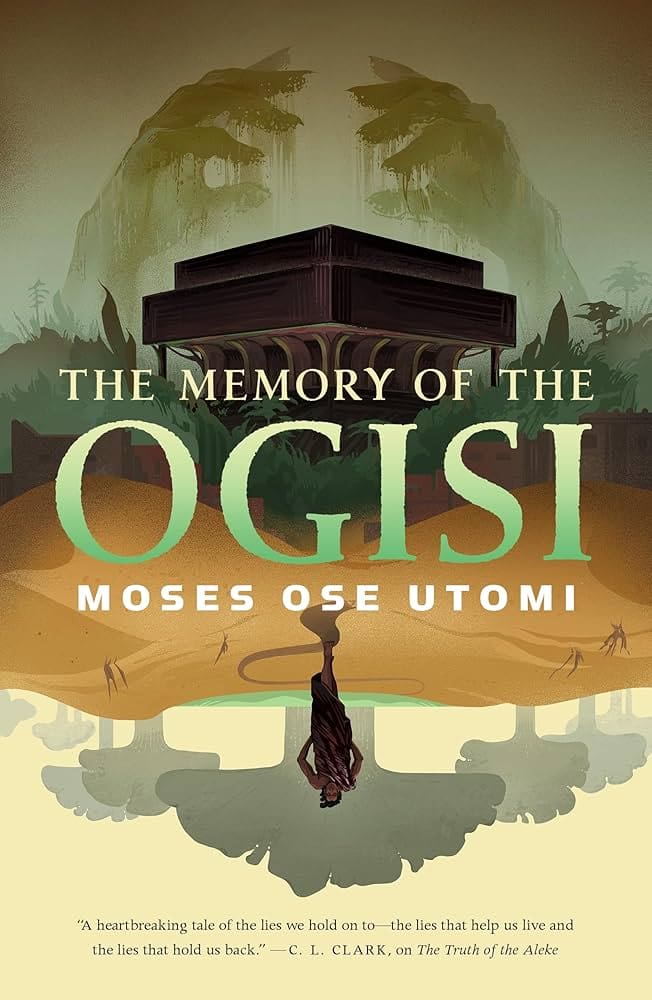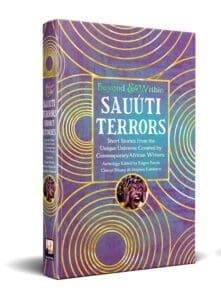
Synopsis:
The epic conclusion to Moses Ose Utomi’s critically-acclaimed Forever Desert series, The Memory of the Ogisi shatters every truth, interrogates every lie, and is a story of oppression you’ll never forget.
Even deserts have a beginning. Even gardens have an end. Even water has a story.
The City of a Thousand Stories stands resolute on the edge of the Forever Desert. It is a lush metropolis, where water flows into every mouth that thirsts and knowledge sprouts in every mind that craves it. Yet despite their prosperity, no one can remember how the city began. It is a dire state of affairs: a people who do not learn their past cannot chart their future.
Ethike is an Ogisi, one of the City’s many historians, who has devoted his life to studying a little-known figure named Osi. He believes Osi to be the key to the city’s origins, but his years of research have only raised more questions about Osi’s identity. Until, one day, he believes he has found the answer.
Spurred by his love for his city and his family, Ethike ventures into the Forever Desert in search of the Lost Tomb of Osi. If he can find it, he will finally be able to prove his worth to the City’s Elders and cement Osi’s role in history. But history is a story told by the powerful. What Ethike uncovers beneath the sand is a power far beyond anything he could have expected…and it wants vengeance.
Review:
Ethike is an Ogisi, a scholar, in the City of Lies. In order to learn the truth of his people’s past, Ethike sets off into the Forever Desert in search of the tomb of Osi. If Ethike can find the tomb, he will not only be able to share Osi’s story, but make his own impact in history. But what he discovers makes his search for truth even more complex.
“A people who do not learn their past cannot chart their future.”
Similar to its predecessors, The Memory of the Ogisi is a reminder that history is told by oppressors. In this third installment of the series, Utomi is quick to remind readers that stories can be inspirational or cautionary, and that “history is a story with no ending.” The Memory of the Ogisi is a beautiful, haunting story that feels equal parts conclusion and beginning.
The novella follows Ethike and Agba who both have unique experiences with storytelling and their journeys to the truth. Whereas Ethike is optimistic about the power and potential of stories, Agba’s own oppression and traumatic experiences have inflamed the anger and fear within him. I really appreciated that Utomi included the POVs of these characters in two parts and how their stories contrasted while also mirroring each other. Both Ethike and Agba come to understand the danger in their own education and that learning is the only way to true freedom.
“To create is divine; to destroy, human.”
The author adds more fantastical elements to The Memory of the Ogisi which weren’t as prevalent in The Lies of the Ajungo or The Truth of the Aleke, but he expertly weaves this magic/mythology into the series as a whole. The Memory of the Ogisi had me on the edge of my seat at times, nervous for the ways that things would unfold and the fantasy elements definitely contributed to this tension. The author never lingers on the fantasy in his novellas, but manages to expand the world he’s created in unique ways.
“He regretted many things in life, but he had never regretted placing faith in other people.”
Utomi’s writing is deeply thematic and lyrical. Reflecting on the importance of education, the value of humanity, and sharing signs of love, I found myself highlighting many sections throughout the book to return to later. I also greatly appreciated that with this “conclusion” the author left much of this book/series to be interpreted by readers, showing that endings and beginnings are not always what they seem.
While this is the end of The Forever Desert series, it’s also a beginning for me as a reader. Utomi’s series is one that will sit with me forever and that I look forward to reading again to see what it means to me further along in my own story.
Many thanks to Moses Ose Utomi for providing me with an eARC of The Memory of the Ogisi. All opinions in this review are my own.







Leave a Reply